#gerard manley hopkins
Text
"The times are nightfall, look, their light grows less"
by Gerard Manley Hopkins
The times are nightfall, look, their light grows less;
The times are winter, watch, a world undone:
They waste, they wither worse; they as they run
Or bring more or more blazon man’s distress.
And I not help. Nor word now of success:
All is from wreck, here, there, to rescue one—
Work which to see scarce so much as begun
Makes welcome death, does dear forgetfulness.
Or what is else? There is your world within.
There rid the dragons, root out there the sin.
Your will is law in that small commonweal.
131 notes
·
View notes
Note
So lately I’ve been very grateful for friends and read something that likened good ones to someone holding an umbrella over you in a downpour. Even when it’s just a silly text that gives you a smile on a shit day.
Anyway, thinking of that made me hanker for a prompt: AU, either Mulder or Scully stuck in a downpour when suddenly a handsome/pretty stranger opens an umbrella over their head.
Cheers to the real ones.
It’s raining.
It’s been raining forever, she thinks. Since she buried him, her belly like a full moon. Her belly pulling at her hips. Since she delivered his son and put lanolin on her chapped nipples and went shh, shh, through endless colicky nights full of Mylicon drops.
Since she handed the stranger - Vanessa, but still a stranger - her son and thought Eili, eili, lama sabachtani?
Raining since then, somewhere. Cold and grey and numbingly staccato. Raining, raining. The sky so fleecy and low.
She’s looking up at his apartment, as she does now; her belly flat as a Midwest highway.
“Jesus,” the man says, canting his umbrella over her as well. It’s a big golf umbrella, pied, as the most beautiful things are. “You look cold in this rain,” he says, tall and handsome as the surgeon she planned to marry once.
Once.
“I left it at work,” she says, a little breathless.
The man smiles down. “Jacob,” he says, and holds out his hand. He’s heterochromatic; one eye as blue as her own, as William’s. One eye as strange as Mulder’s.
“Dana,” she says, a little hitch in her voice. A little sob.
She’s cold and cold and cold, even with her hair grown out around her hollow face. Even with Doggett, who says “Agent Scully.”
Even with Skinner, who says, “Scully. Dana, DANA.”
***
Jacob, didn’t he fight an angel? Didn’t he wait fourteen years for the woman he loved? She’s drunk on a mid-range Beaujolais, can’t remember.
Fucks Jacob so she doesn’t freeze. Doesn’t burn. It’s good and warm and honest and she’s so very sorry. She’s so sorry, his lashes like the fringe on a velvet lampshade.
Scully sees his umbrella against the wall, wet and black and white. Furled like the wings of a bat as she leaves. The moon outside is a crescent. A rib. scythe.
“I love you,” she gasps, to no one. “I love you always.”
Grief is love with nowhere to go.
It’s drizzling, noncommittal and misty. “Spitting,” Mulder would say. Oxford.
He would say it, if he were here.
***
Jacob calls, even when the sun is shining.
She doesn’t answer. She looks away.
He calls less.
He doesn’t call.
***
“All things counter, original, spare, strange;
Whatever is fickle, freckled (who knows how?)
With swift, slow; sweet, sour; adazzle, dim;
He fathers-forth whose beauty is past change:
Praise him.”
35 notes
·
View notes
Text


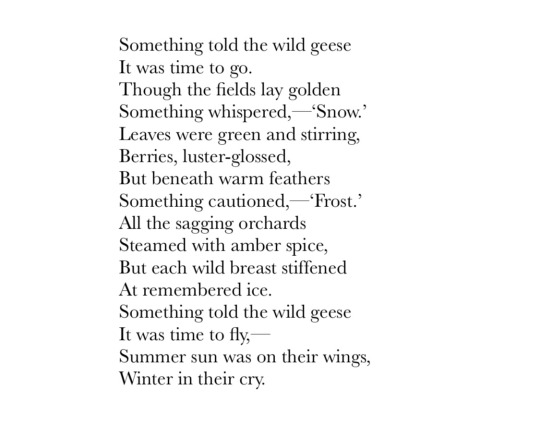

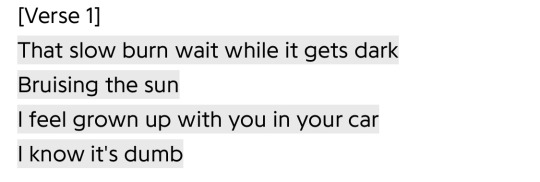
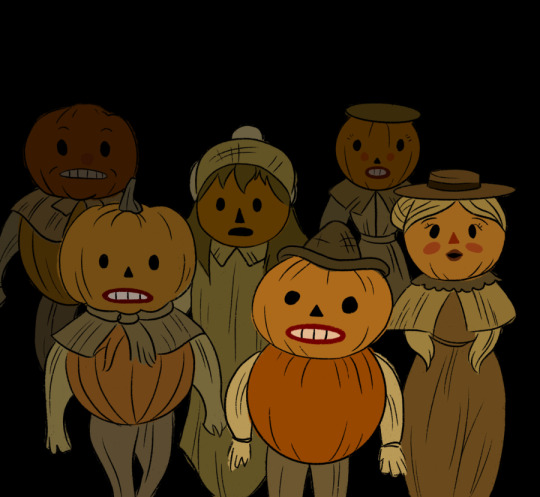
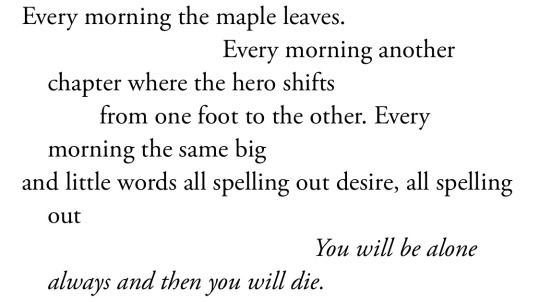


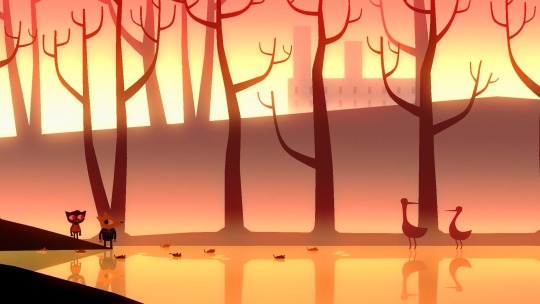
a fond and forlorn goodbye to autumn.
-
into the unknown, patrick mchale / autumn effect at argenteuil 1873, claude monet / something told the wild geese, rachel field / kiki's delivery service, studio ghibli / a world alone, lorde / over the garden wall, patrick mchale / litany in which certain things are crossed out, richard siken / unknown / pied beauty, gerard manley hopkins / night in the woods, infinite fall & secret lab
#my first attempt at web weaving#sorry if there's a particular way i'm supposed to cite things i couldn't figure it out </3#webweaving#web weaving#autumn#fall#fall leaves#over the garden wall#claude monet#monet#rachel field#poetry#art#kiki's delivery service#studio ghibli#lorde#richard siken#writing#pied beauty#gerard manley hopkins#night in the woods#autumn aesthetic#web weave#webweave#ww#comparitives#comparitive
213 notes
·
View notes
Text
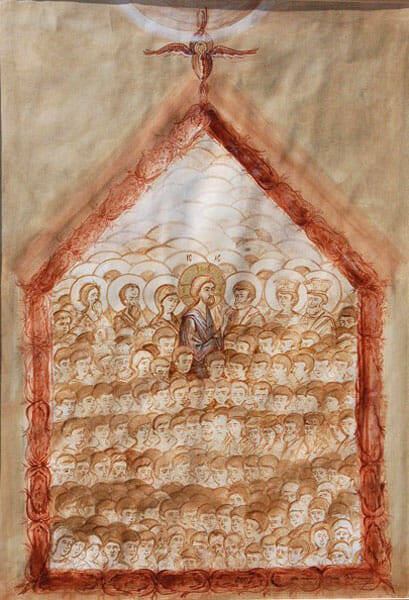
“... for Christ plays in ten thousand places,
Lovely in limbs, and lovely in eyes not his
To the Father through the features of men’s faces.”
~From As Kingfishers Catch Fire, by Gerard Manley Hopkins
(Art: Ecclesia, by Elena Murariu)
59 notes
·
View notes
Text
“Patience, hard thing! The hard thing but to pray,
But bid for, Patience is! Patience who asks
Wants war, wants wounds; weary his times, his tasks;
To do without, take tosses, and obey.
Rare patience roots in these, and, these away,
Nowhere. Natural heart’s ivy, Patience masks
Our ruins of wrecked past purpose. There she basks
Purple eyes and seas of liquid leaves all day.
We hear our hearts grate on themselves: it kills
To bruise them dearer. Yet the rebellious wills
Of us we do bid God bend to him even so.
And where is he who more and more distils
Delicious kindness?—He is patient. Patience fills
His crisp combs, and that comes those ways we know.”
— Gerard Manley Hopkins
41 notes
·
View notes
Text
Counterpoint, a collection





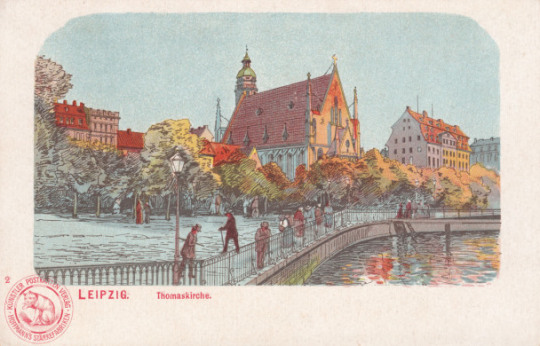
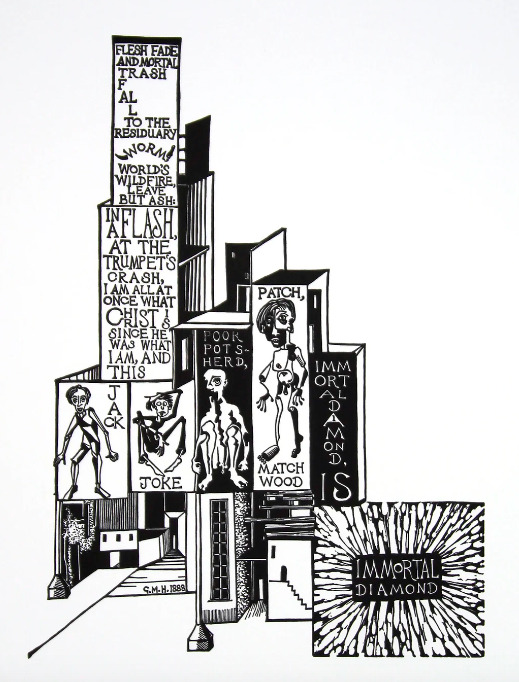
Bach's Fugue 4 in C# minor from Well-Tempered Clavier I, autograph
Gaudy Night, by Dorothy L. Sayers
Bach's Fugue 4 in C# minor from WTC I, performed by Kimiko Ishizaka
Pale Fire, by Vladimir Nabokov
Uncredited illustration from The New Yorker, March 6, 2023
An Essay on Man, Alexander Pope
Thomaskirche, Leipzig, postcard
Original Print: That Nature is a Heraclitean Fire (Gerard Manley Hopkins), from The Wytham Studio
#Counterpoint#johann sebastian bach#gerard manley hopkins#gaudy night#leipzig#thomaskirche#well-tempered clavier#fugue#pale fire#vladimir nabokov#alexander pope#music#web weaving#dorothy l sayers
44 notes
·
View notes
Text
"I caught this morning morning's minion, king- / dom of daylight's dauphin, dapple-dawn-drawn Falcon, in his riding / Of the rolling level underneath him steady air, and striding / High there, how he rung upon the rein of a wimpling wing / In his ecstasy!"
Read it here | Reblog for a larger sample size!
#closed polls#polls#poetry#poems#poetry polls#poets and writing#tumblr poetry#have you read this#the windhover#gerard manley hopkins
9 notes
·
View notes
Text
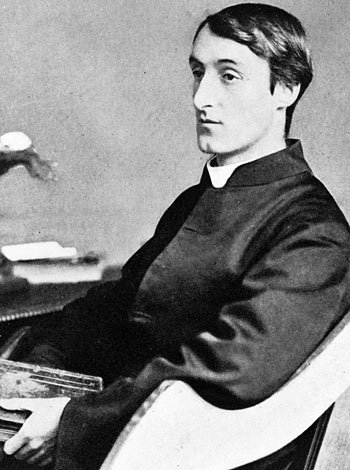
Gerard Manley Hopkins was born on the 28th of July, 1844 in Essex, to devout High Church Anglicans, who may have had Welsh roots (based on the surname Hopkins).
At Oxford, he became close to poet Robert Bridges and became estranged from his family due to his conversion to Catholicism. Gerard then became a Jesuit.
He continued his education at St Beuno's College in Denbighshire and started to more strongly identify with Wales. He wrote poems about Wales and Welsh identity and started to learn Welsh and of Welsh poetry such as the 'Cywydd' and 'Cynghanedd'. He left Wales when ordained to the priesthood.
Many of his poems also were homoerotic. It is thought some of these poems were inspired by, or directed towards, Digby Mackworth Dolben, another poet, who he seemed to have fallen in love with at Eton. Gerard was told by his Anglican confessor to stay away from Digby, who died a couple of years later from accidental drowning.
Digby was a 'Urainian poet,' a group of 'male homosexual poets' of the 19th and 20th century, and arguments have been made that Gerard should be included in this group. His sexually was however certainly repressed and he isolated himself at the end of his life.
Gerard suffered from ill health and so-called melancholia, which today some believe to have been bipolar disorder or major depression. His last words were "I am so happy, I am so happy."
Gerard Manley Hopkinds died of typhoid fever on the 8th of June, 1889, in Dublin, where he was buried in a Jesuit plot.
#gerard manley hopkins#history#queer history#gay history#queer welsh history#welsh history#uk history#pride#links#lgbtqia#m
23 notes
·
View notes
Note
Hello Ani! I hope you're doing so so well!
I am shamelessly asking for my aura if you're not tired of these asks already <3
@macontheweb hello, lovely Mac! I hope you’re doing well, too! 💜
Your aura is the color of the rare and stunning Death Valley Superbloom:
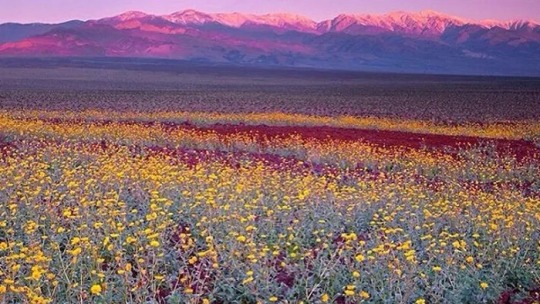
The Death Valley Superbloom is one of the most incredible phenomena to grace US national parks—in this case, Death Valley, which got its name in part because it is usually the hottest and driest national park in the country. But it’s also home to something astonishing: every now and again, when the wind, temperature, and rain are exactly right, what is normally rock and soil bursts with gorgeous, colorful softness.
We often think of deserts in terms of their hardiness, their endurance—the conditions they are capable of creating and persisting through. Sometimes, this is metaphor enough—sometimes people need to hear that they are strong, and that is okay. But in my experience, the opposite is also true: sometimes we get in a habit of telling people that they are strong, that they are resilient, and this gift can start to feel a lot like an extra burden to carry. Strength, in so many respects, is something we put on for other people. Instead, sometimes we need to hear that we can be vulnerable, we can be soft, we can show our tender bellies and hearts to the world and trust that it can sustain us for a little while, instead of the other way around. So, too, the color of your aura: look what delicate gorgeousness can bloom when all that strength gets to give way to what is resting underneath, waiting for its moment in the sun.
In another one of my favorite Gerard Manley Hopkins poems, in which he is trying to convince his mind to let him have a moment of peace, he urges himself to “leave comfort root-room.” And I think this is a kind of Superbloom, too.
💜💜💜💜
#auras#ask game#Death Valley Superbloom#I love everyone in this Chili’s tonight#gerard manley hopkins#no bourbon cream tonight#but friends I have cracked open the Madeira#fun Ani fact: two of my three tattoos are lines from this poem!
11 notes
·
View notes
Text


7 notes
·
View notes
Text
Part V: 15 More Favourite Poems
I Bargained with Life for a Penny, by Jessie B. Rittenhouse
Rain, by Raymond Carver
Poems from Dear Sal, by Jeremy Radin
Starlings in Winter, and
In Blackwater Woods, by Mary Oliver
Two Insomnias, and
Let the Lover Be, and
Without Cause, by Rumi
Life, by Charlotte Brontë
Spring and Fall, by Gerard Manley Hopkins
Departure, by Louise Glück
A Man Said to the Universe, by Stephen Crane
Short Song, by Justin Quinn
A Shropshire Lad XL, by A.E. Houseman
Idyll, by Siegfried Sassoon
See also Part One, Part Two, Part Three, Part Four
#poetry#poem#favpoems#raymond carver#rumi#mary oliver#charlotte bronte#gerard manley hopkins#louise glück#stephen crane#ae housman#siegfried sassoon#justin quinn#jessie b rittenhouse#jeremy radin#dear sal
8 notes
·
View notes
Text
Inversnaid
Gerard Manley Hopkins
This darksome burn, horseback brown,
His rollrock highroad roaring down,
In coop and in comb the fleece of his foam
Flutes and low to the lake falls home.
A windpuff-bonnet of fawn-froth
Turns and twindles over the broth
Of a pool so pitchblack, fell-frowning,
It rounds and rounds Despair to drowning.
Degged with dew, dappled with dew,
Are the groins of the braes that the brook treads through,
Wiry heathpacks, flitches of fern,
And the beadbonny ash that sits over the burn.
What would the world be, once bereft
Of wet and wildness? Let them be left,
O let them be left, wildness and wet;
Long live the weeds and the wilderness yet.
#poetry#gerard manley hopkins#this is what sparked the last post#(along with several other poems i've read lately but this was the final piece in the tower)#i opened the anthology and started casually reading it aloud to myself#only to find myself nearly laughing with delight as the rhythm took hold in the first stanza#speeding me along much faster than intended#tumbling over letters like stones in a brook#ROLLrock HIGHroad ROARing down#i was finding myself wanting to add syllables later on to keep the rollicking rhythm going#and then going back to appreciate the rhythm that was already there#'long live the weeds and the wilderness yet' needs to be on a poster or a sampler or notebook or something that i own
16 notes
·
View notes
Text
One of the peculiar things about philosophy is how it taps into ordinary powers that lie hidden in everyday speech. The little word “as,” for example, is central to phenomenology because it is central to experience. Look at something. What do you see? Socks, a dog, another person. You don’t see some generic sensible thing; rather, you see what you see as something or another: as being socks, as being a dog, as being another person, and so on. Listen. What do you hear? A car passing, birds chirping, music playing. You don’t hear raw noise that you subsequently interpret; you hear sounds as sounds of things; a sound you cannot identify as something or another attracts notice and you wonder, What was that? You don’t know what to interpret it as. The as names the primary synthetic quality of experience that registers the identity of what is sensed and what is understood, of what is experienced and what can be said.
“It’s a muggy day.” Here we perceive the day as muggy; perhaps the humidity is high, the breeze nonexistent, and the temperature immoderate. We see all these things as together comprising the mugginess of a muggy day. Speech allows us to express the as of experience according to the is of speech. Taking the day as muggy enables us to express the fact that the day is muggy.
Typically, language and experience work in tandem. It’s hard for us to experience what has not already been put into words, and it is hard to express an experience for the first time. The poet is one practiced in the extraordinary art of expanding the circle of language and experience. Gerard Manley Hopkins, for example, looks out at the same world we see but invites us to understand it anew, to see it as manifesting what he calls “pied beauty.” The first stanza of his poem by that name reads as follows:
Glory be to God for dappled things –
For skies of couple-colour as a brinded cow;
For rose-moles all in stipple upon trout that swim;
Fresh-firecoal chestnut-falls; finches’ wings;
Landscape plotted and pieced – fold, fallow, and plough;
And áll trádes, their gear and tackle and trim.
Hopkins invites us to see the sky, a cow, trout, finches, landscapes, and tools as manifestations of a single phenomenon, piedness. Further, he wants us to see piedness as something beautiful. Hopkins calls attention to the beauty of complex contrasts, something that shows up naturally enough in our experience, but something that it nevertheless takes a poet to highlight and name. As a result of his poetry, the beauty of what is “counter, original, spare, strange” can now show up for us more readily and explicitly when we look at things. Thereafter we can look out an airplane window at a patchwork of fields down below and register them as being beautiful in their piedness. That is, thanks to Hopkins we can now better see things as instances of piedness and see piedness as something that is beautiful. Poets give us words to see something in a new way; they unlock a further as latent in the world of experience. In doing so they make available to the rest of us a richer way of understanding and speaking about experience.
Chad Engelland, Phenomenology
114 notes
·
View notes
Text
I think that the trivialness of life is . . . done away with by the Incarnation–or, I shd. say the difficulty wh. the trivialness of life presents ought to be. It is one adorable point of the incredible condescension of the Incarnation (the greatness of which no saint can have ever hoped to realise) that our Lord submitted not only to the pains of life, the fasting, scourging, crucifixion etc., or the insults, as the mocking, blindfolding, spitting etc., but also to the mean and trivial accidents of humanity.
Gerard Manley Hopkins
3 notes
·
View notes
Text
“The Windhover” by Gerard Manley Hopkins
I caught this morning morning's minion, king-
dom of daylight's dauphin, dapple-dawn-drawn Falcon, in his riding
Of the rolling level underneath him steady air, and striding
High there, how he rung upon the rein of a wimpling wing
In his ecstasy! then off, off forth on swing,
As a skate's heel sweeps smooth on a bow-bend: the hurl and gliding
Rebuffed the big wind. My heart in hiding
Stirred for a bird, – the achieve of, the mastery of the thing!
Brute beauty and valour and act, oh, air, pride, plume, here
Buckle! AND the fire that breaks from thee then, a billion
Times told lovelier, more dangerous, O my chevalier!
No wonder of it: shéer plód makes plough down sillion
Shine, and blue-bleak embers, ah my dear,
Fall, gall themselves, and gash gold-vermilion.
#poetry#english poetry#english literature#poetry quotes#Gerard Manley Hopkins#the windhover#classic poetry
47 notes
·
View notes
